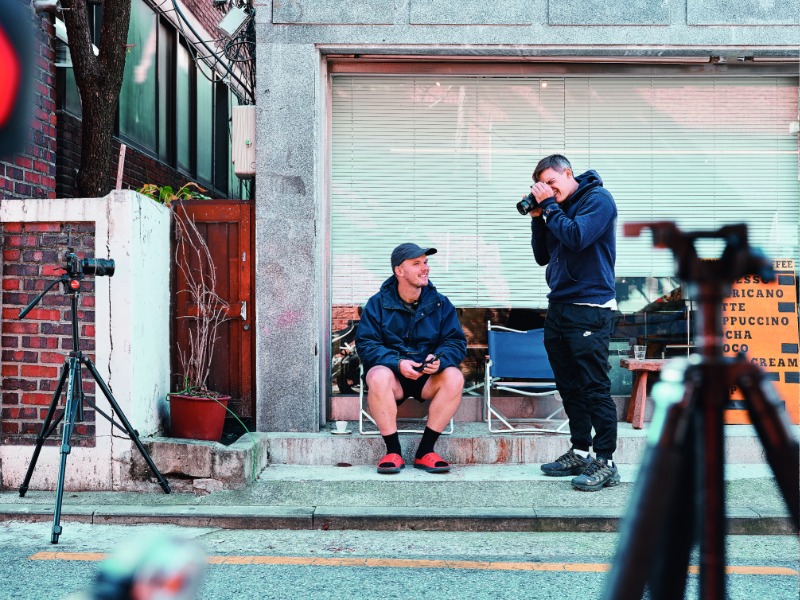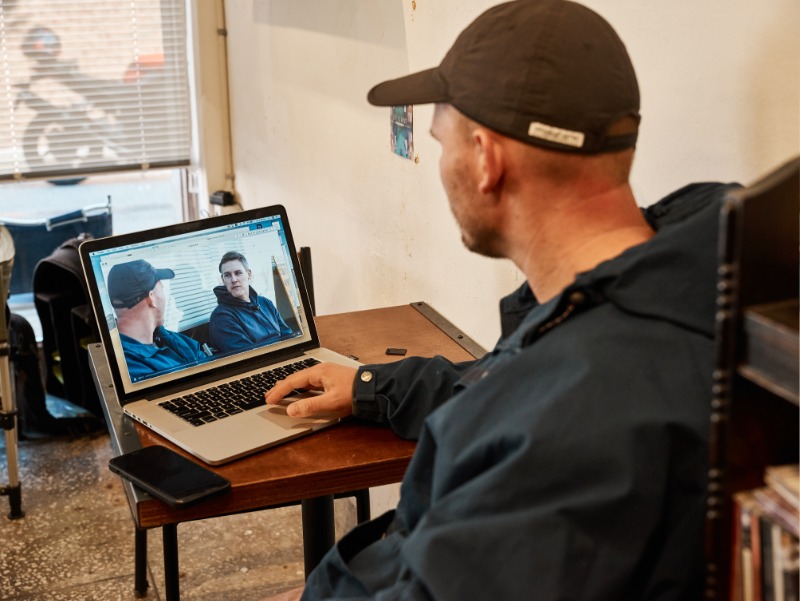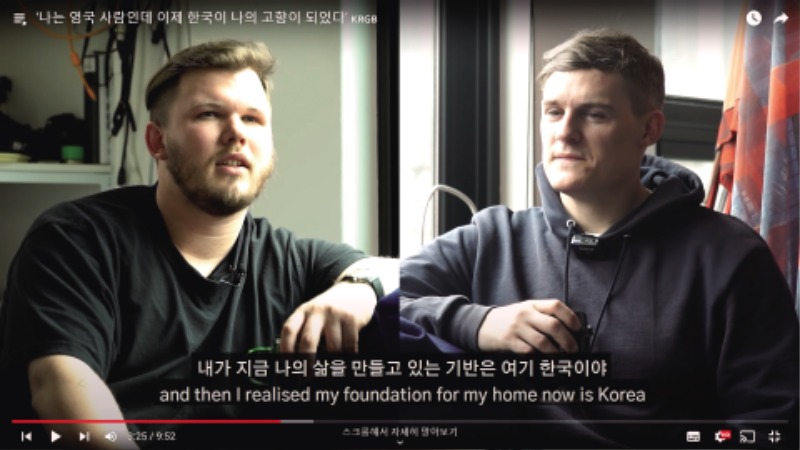YouTube is their main medium. Their ive is to tell a story. Britons Daniel Bright and Joel Bennett do it by simply inviting strangers to pause and chat over a meal or drink.

Daniel Bright (seated) and Joel Bennett prepare to shoot another installment for their YouTube channel, “Dan and Joel.” They like to wave at and chat with passersby, enjoying such everyday encounters.
Daniel Bright and Joel Bennett sit down outside a cafe in an alley of Yeonnam-dong, Seoul, and prepare to film their next video. It is a sunny late autumn afternoon. They will be leaving for London soon to shoot a promotional video on a Korean Wave event in London for the state-funded trade and investment promotion agency KOTRA, and it seems a good time to reflect on their past five years in Korea. As they set up their cameras – greeting everyone who walks past – an elderly gentleman stops to chat, eager to practice speaking English. The Yakult lady chugs by on her motorized cart and they wave. “It’s moments like these, that’s what I love about being here,” says Bennett.
PEOPLE AND THEIR STORIES
These moments may seem ordinary but that is the whole idea. Bright and Bennett operate the YouTube channel “Dan and Joel,” and their videos are based on the simple premise that everyone has a fascinating story to tell.
When the two Britons arrived in 2017, they say they made more stereotypical content, walking around and talking to the camera – two more foreigners having fun in Korea. “As we progressed, we were encouraged to take a step back and take a more observational look at Korea. A big part of that was our faith in God, and the time we were spending asking him what kind of content he wanted us to make,” says Bennett.
They pinpoint two videos that marked a change in their style and direction. One day, Bright decided to take a table outdoors and make some kimchi jjigae while Bennett filmed him. “This moment came when people started to gather round and this interaction began, which Dan was able to do thanks to his Korean language ability, his friendliness, and warmth,” says Bennett.
On another occasion, they were about to leave Gwangjang Market around closing time when they saw a man sit down at a stall with a few bottles of soju. “He looked a bit sad, or lonely. It was a feeling that you can’t specifically describe,” Bright says. He went to talk with the man while Bennett filmed.
“We were no longer looking at the camera, entertaining. It was just me and this guy having a drink together and talking,” Bright says. Later they realized that it was a unique interlude. Soon their videos began to resemble aries, “capturing the moment rather than contriving or forcing it,” as Bennett puts it.
People around them – an old lady eking out a living collecting scrap cardboard, a homeless man living at Seoul Station, and others – catch the duo’s attention, leading to straightforward videos, with Bright sitting down with people to eat and chat. Even before moving to Korea, Bright always stopped and talked to every homeless person he saw, Bennett notes.
Bright remembers comments such as “Oh, it’s just because you’re foreigners,” or “You’re just doing that to make content.” “It’s a funny thing to say because, yes, it is content. It’s like saying I’m sitting in this chair to sit in this chair,” he muses. “But I think people like our content because it’s not too provocative or intense. When we talk about social issues, we don’t tell people what to think. I’m more interested in meeting the person. The fact that the homeless man was living in Seoul Station was fascinating but it wasn’t his identity.” Viewers say they love the videos and often leave comments on their warmth, depth and visual quality.
CONVERGING LIVES
Bright and Bennett met through a mutual friend, Josh Carrott of the “Korean Englishman” YouTube channel. First, they appeared in his videos and then they decided to branch out on their own to do something a bit different. It entailed moving to Korea.
The ary quality that emerged in their videos can be attributed to their skills and perspectives. Bennett studied film and video at London College of Communication. After graduating in 2010, he worked with a company making ethnographic videos for marketing purposes. “Mundane stuff, filming people brushing their teeth for instance. But varied demographics, from slums to rich places, and in Europe, Africa, China… It really gave me an eye for not just seeing things at the surface level,” he says.
Bright did an online master’s degree in photojournalism at the same school in 2019. But before that he majored in Korean studies and linguistics at SOAS University of London, and also worked at the Korea Trade Center in London for two years after graduation. While growing up on the coast of North Wales, he was quite familiar with Korea. He attended a church where the pastor had a Korean wife. He first came to Korea for a year in 2012 as an exchange student.
Bennett on the other hand says he hardly realized Korea existed until the 2002 FIFA World Cup was held here. He was into B-boying and had a vague notion that there would be many other street dancers in Korea. But through a friend he ended up doing a four-week stint teaching English in Pohang in 2011.

Bright and Bennet do not seek fun only or make provocative content just to increase the number of views. For them, YouTube is a medium for communicating sketches of all types of people, including the young and old, the employed and the homeless.
BEING KOREAN?
The camera has also been turned on foreigner friends in Korea for the series “Woori Mates.” It is the same kind of conversation format. One of the subjects they address is “Will I ever be Korean?” Korean immigrants around the world have for decades wondered if they would ever fit in. To hear people from other countries discuss identity issues in Korea is eye-opening.
For Bennett, living in Korea has made him question what it is to be British. “I grew up in a multicultural society in Bedford, just outside of London. Most of my friends were mixed,” he says. When he returned to the UK last year for visa reasons, he said he felt genuinely anxious. “Dan asked me, ‘Do you think you’ve become Korean?’ I don’t think so, but I don’t think I am who I was when I left.” He is now engaged to a Korean woman who grew up in the Philippines and discussion of “third-culture” children wondering where they belong is another thread in their videos.
Bright’s take on the subject seems to be summed up in the title of his book (written in Korean) “Jeo mapogu saram indeyo?” which translates to “I’m From Mapo-gu” and is an answer to “Where are you from?” In his book he says, “Mapo-gu [Mapo District] is where I settled when I first came to Korea, it’s where I live now, where we started as YouTube creators, and where my child was born.”
Bright’s wife is a Korean woman he met in London. They have a young son, Anu. “I don’t want my kid walking around thinking, ‘Oh, I’m really British’ or ‘Oh, I’m really Korean.’ I don’t want that to be a big weight for him,” he says. “I think identity is about how you feel about yourself and how you live your life.”
When they turn their cameras onto themselves, they discuss all sorts of issues that touch on their lives such as interracial and intercultural dating and marriage, being a British father in Korea, tattoos, their Christian faith and food. Sometimes they speak Korean. Other times, they converse in English. Accents and dialects in both languages are added for fun.

“Dan and Joel” also features stories about the reality of living in Korea as a foreigner. After five years of ing many conversations, the hosts are taking stock and wondering about the future.
ⓒ DanandJoel
THE FOOD CONNECTION
Food plays a big part in the “Dan and Joel” repertoire. It is nearly always present in the videos, sometimes as the main star and sometimes in the background.
“Growing up, I didn’t really like food,” Bennett says. At some point he says he stopped eating meat and remembers the jeering he got when he ordered a veggie burger at a friend’s birthday party at a burger place. “Then I moved here, and I’ll never forget the first time I had BBQ. It just blew my mind. But more than the food, it’s the way Koreans eat, the collective nature of it. You’re sitting around the table cooking meat together or sharing jjigae. For me, it was a drastic cultural change,” he says.
For Bright it was the opposite: “I grew up in a family where food was very important. Before almost every meal we’d be like ‘What’s the meal? What’s the meal?’ Every meal was so intense, almost too important. I think I appreciate Korean food culture because I come from an environment where food was really important.” His wife shares his love of food and they talk about it a lot. “It’s a very precious thing and a big part of my life,” Bright says.
The ethos of sitting down over food and swapping stories is so simple and yet so appealing. As of November 2022, the Dan and Joel YouTube channel has 310,000 subscribers. People think they are amassing a fortune. So, the question has to be asked: “Is it sustainable?” They laugh. “No!” says Bennett. “I would not disagree,” Bright chimes in.
They supplement their income with freelance writing and film work. Bright also works part-time as a creative content producer for Tokki Soju and Bennett also has a personal YouTube channel. After five years and 256 videos, the duo are in transition. Rather than being YouTubers they see themselves as content creators using the platform. Now they wonder if they can continue making content, make a living for their families, and even if it is time to stop. Their subscribers encourage them and ask them not to quit. So far, it seems more stories will be told at least for a while longer.
Cho Yoon-jung Translator and Freelance Writer
Heo Dong-wuk Photographer